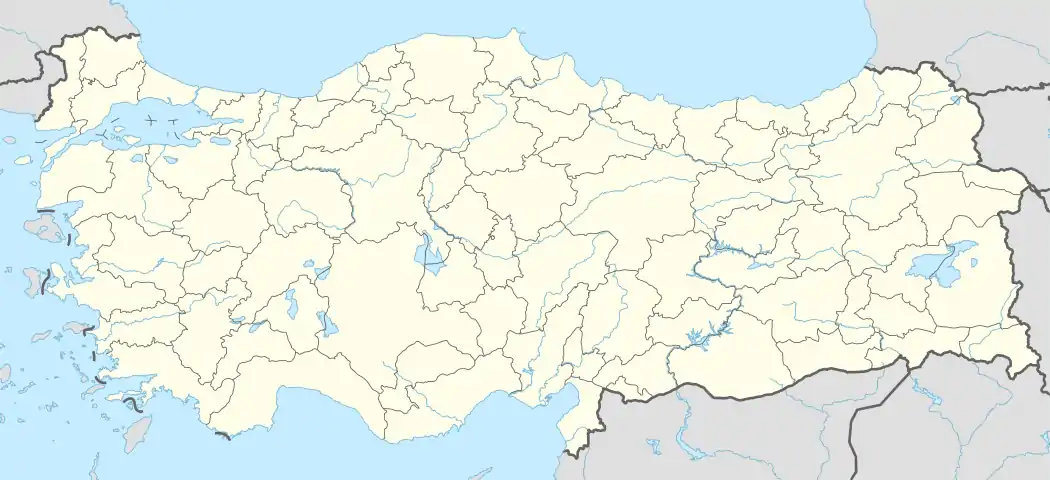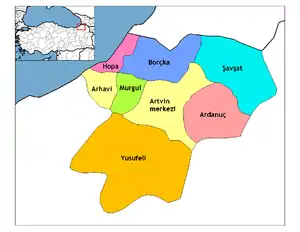Şavşat
Şavşat (Georgian: შავშეთი, romanized: shavsheti) is a town and district of Artvin Province in the Black Sea region, between the cities of Artvin and Kars on the border with Georgia at the far eastern end of Turkey.
Şavşat | |
|---|---|
 | |
 Şavşat  Şavşat | |
| Coordinates: 41°14′36″N 42°21′50″E | |
| Country | Turkey |
| Province | Artvin |
| Government | |
| • Mayor | Ahmet Sinan Öztürk (AKP) |
| • Kaymakam | Salih Altun |
| Area | |
| • District | 1,376.61 km2 (531.51 sq mi) |
| Elevation | 1,174 m (3,852 ft) |
| Population (2012)[2] | |
| • Urban | 6,753 |
| • District | 17,660 |
| • District density | 13/km2 (33/sq mi) |
| Post code | 08700 |
| Climate | Dfb |
History
Shavshat was a part of a province of Greater Armenia - Gugark. After 387 this land was a part of Marzpan Iberia (vassal of Iran). After this, in IX century it was one of the Georgian princedoms in the constellation of several polities which is conventionally known as Tao-Klarjeti in Georgian. The princedom of Shavsheti included today's districts of Şavşat, Borçka, and Murgul in Turkey and Lower Machakheli in Adjara (Georgia). The fortress above the town is primarily of Georgian construction and probably dates from the 9th century A.D., when it was rebuilt by Adarnase I of Iberia. The site has an impressive circuit wall with strategically placed towers and rooms, including two small chapels. In 1983 the fortress was surveyed and three years later an accurate scaled plan and description were published.[3]
This lasted until it was conquered by the Ottomans in 1547.
Following the Russo-Turkish War (1877-1878) Şavşat was among the territories ceded to Russia, and was returned to the new Republic of Turkey in 1921. It was briefly bounded to Ardahan Province between 27 February 1921 and 7 July 1921. People living in Şavşat and Imerkhevi are largely Meskhetian Turks and Muslim Georgians.
Geography
Like most districts of Artvin this is a beautiful hilly area surrounded by high mountains on all sides, including the 3,537-metre (11,604 ft) Karçkal mountains to the west, and watered by many mountain streams and pools. There are trout in the largest, Şavşat Karagöl lake and a number of mineral water springs. The area has a cold inland climate, somewhat tempered by being above the Black Sea coast, but at these altitudes winter lasts a long time; it snows from November to April. The mountains are covered with pine forest, with some broadleaf forest at lower elevations.
In this landscape there is little agricultural land, no industry and the only real potential income is from tourism (people on trekking holidays), herding animals on the mountainside and beekeeping. There are some fruit trees (mainly pears and apples) and some potatoes are grown in the Çoruh River valley floor. Of the land area 13% can be planted while 27% is used for grazing, 42% is forest and 17% is high mountain.
The town of Şavşat is small (population 7,325) and has few amenities.
Climate
The climate in Şavşat is a mild/cool summer subtype (Köppen: Dfb) of the humid continental climate.
| Climate data for Şavşat | |||||||||||||
|---|---|---|---|---|---|---|---|---|---|---|---|---|---|
| Month | Jan | Feb | Mar | Apr | May | Jun | Jul | Aug | Sep | Oct | Nov | Dec | Year |
| Daily mean °C (°F) | −3.6 (25.5) |
−1.9 (28.6) |
2.6 (36.7) |
8.6 (47.5) |
12.9 (55.2) |
16.0 (60.8) |
19.4 (66.9) |
19.3 (66.7) |
15.8 (60.4) |
10.4 (50.7) |
4.6 (40.3) |
−0.8 (30.6) |
8.6 (47.5) |
| Average precipitation mm (inches) | 45 (1.8) |
42 (1.7) |
37 (1.5) |
56 (2.2) |
71 (2.8) |
78 (3.1) |
51 (2.0) |
49 (1.9) |
49 (1.9) |
61 (2.4) |
57 (2.2) |
57 (2.2) |
653 (25.7) |
| Source: Climate-Data.org[4] | |||||||||||||
Villages
- Çağlıpınar
- Çağlıyan
- Çayağzı
- Çermik
- Çoraklı
- Çukur
- Demirci
- Demirkapı
- Dereiçi
- Dutlu
- Erikli
- Ilıca
- Karaağaç
- Karaköy
- Kayabaşı
- Kayadibi
- Kirazlı
- Kireçli
- Kocabey
- Köprülü
- Köprüyaka
- Küplüce
- Kurudere
- Maden
- Meşeli
- Oba
- Otluca
- Pınarlı
- Şalcı
- Savaş
- Saylıca
- Sebzeli
- Şenköy
- Şenocak
- Susuz
- Tepebaşı
- Tepeköy
- Üzümlü
- Veliköy
- Yağlı
- Yamaçlı
- Yaşar
- Yavuzköy
- Yeşilce
- Yoncalı
- Yukarıkoyunlu
- Ziyaret
Places of interest
- Papart forest
- Qenciyan Hill, overlooks the border
- Şavşat Karagöl lake, a large trout lake in the forest, and the crater lake of Kuyruklu.
- Satle Fortress, also known as Shavsheti Fortress, (Turkish: Şavşat) is a monument of Georgian architecture located above the town of Şavşat.
References
- "Area of regions (including lakes), km²". Regional Statistics Database. Turkish Statistical Institute. 2002. Retrieved 2013-03-05.
- "Population of province/district centers and towns/villages by districts - 2012". Address Based Population Registration System (ABPRS) Database. Turkish Statistical Institute. Retrieved 2013-02-27.
- Robert W. Edwards, “The Fortifications of Artvin: A Second Preliminary Report on the Marchlands of Northeast Turkey,” Dumbarton Oaks Papers 40, 1986, pp.174-76, pls.31-43.
- "Climate: Șavşat". Climate-Data.org. Retrieved 12 April 2014.
External links
| Wikimedia Commons has media related to Şavşat. |
